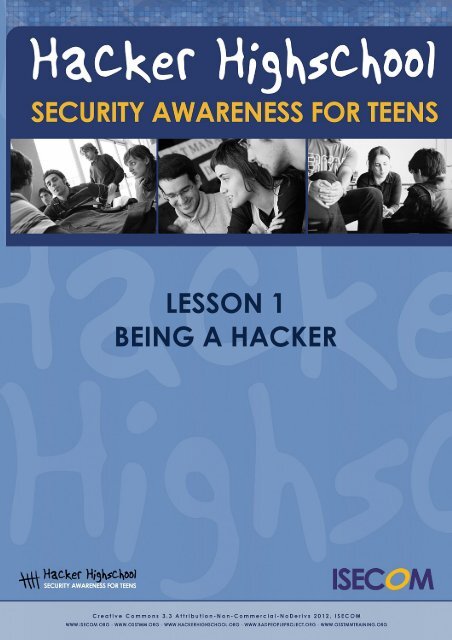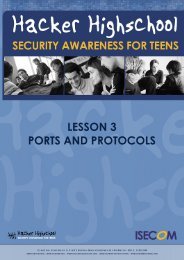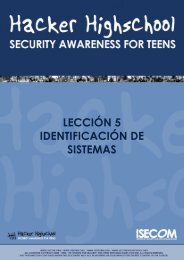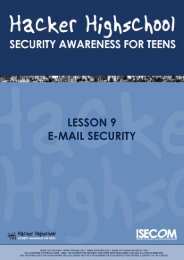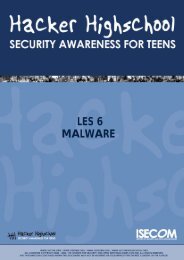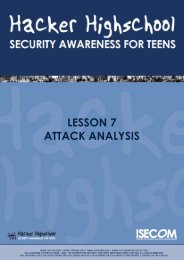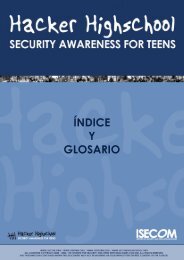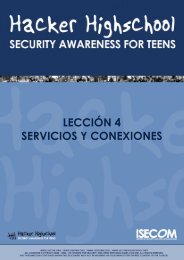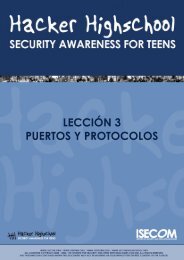Lesson 1: Being a Hacker - Hacker Highschool
Lesson 1: Being a Hacker - Hacker Highschool
Lesson 1: Being a Hacker - Hacker Highschool
Create successful ePaper yourself
Turn your PDF publications into a flip-book with our unique Google optimized e-Paper software.
LESSON 1<br />
BEING A HACKER
2<br />
<strong>Lesson</strong> 1: <strong>Being</strong> a <strong>Hacker</strong><br />
WARNING<br />
The <strong>Hacker</strong> <strong>Highschool</strong> Project is a learning tool and as with any learning tool there<br />
are dangers. Some lessons, if abused, may result in physical injury. Some additional<br />
dangers may also exist where there is not enough research on possible effects of<br />
emanations from particular technologies. Students using these lessons should be<br />
supervised yet encouraged to learn, try, and do. However ISECOM cannot accept<br />
responsibility for how any information herein is abused.<br />
The following lessons and workbooks are open and publicly available under the following<br />
terms and conditions of ISECOM:<br />
All works in the <strong>Hacker</strong> <strong>Highschool</strong> Project are provided for non-commercial use with<br />
elementary school students, junior highschool students, and highschool students whether<br />
in a public institution, private institution, or a part of home-schooling. These materials may<br />
not be reproduced for sale in any form. The provision of any class, course, training, or<br />
camp with these materials for which a fee is charged is expressly forbidden without a<br />
license, including college classes, university classes, trade-school classes, summer or<br />
computer camps, and similar. To purchase a license, visit the LICENSE section of the HHS<br />
web page at http://www.hackerhighschool.org/licensing.html.<br />
The <strong>Hacker</strong> <strong>Highschool</strong> Project is an open community effort and if you find value in this<br />
project, we ask that you support us through the purchase of a license, a donation, or<br />
sponsorship.
3<br />
<strong>Lesson</strong> 1: <strong>Being</strong> a <strong>Hacker</strong><br />
Table of Contents<br />
For the Love of Hacking....................................................................................................................... 5<br />
Why Be a <strong>Hacker</strong>?................................................................................................................................ 7<br />
How to Hack.......................................................................................................................................... 9<br />
Two Ways to Get What You Want................................................................................................... 9<br />
Feed Your Head: Espionage.............................................................................................................. 10<br />
Hacking to Take Over Your World................................................................................................. 11<br />
The Four Point Process........................................................................................................................ 12<br />
The Echo Process............................................................................................................................ 12<br />
What to Hack...................................................................................................................................... 14<br />
Feed Your Head: Classes and Channels.......................................................................................... 14<br />
Feed Your Head: Porosity................................................................................................................... 17<br />
Resources............................................................................................................................................. 17<br />
Books................................................................................................................................................ 18<br />
Magazines and Newspapers......................................................................................................... 19<br />
Feed Your Head: Speculation............................................................................................................ 21<br />
Search Engines................................................................................................................................ 22<br />
Websites and Web Applications................................................................................................... 23<br />
Zines................................................................................................................................................. 24<br />
Blogs................................................................................................................................................. 24<br />
Forums and Mailing Lists ................................................................................................................ 25<br />
Newsgroups..................................................................................................................................... 26<br />
Wikis.................................................................................................................................................. 26<br />
Social Media................................................................................................................................... 27<br />
Chat................................................................................................................................................. 28<br />
P2P.................................................................................................................................................... 28<br />
Certifications................................................................................................................................... 29<br />
Seminars........................................................................................................................................... 30<br />
Further Study ....................................................................................................................................... 31
4<br />
<strong>Lesson</strong> 1: <strong>Being</strong> a <strong>Hacker</strong><br />
Contributors<br />
Pete Herzog, ISECOM<br />
Glenn Norman, ISECOM<br />
Marta Barceló, ISECOM<br />
Chuck Truett, ISECOM<br />
Kim Truett, ISECOM<br />
Marco Ivaldi, ISECOM<br />
Shaun Copplestone, ISECOM<br />
Greg Playle, ISECOM<br />
Jeff Cleveland, ISECOM<br />
Simone Onofri, ISECOM<br />
Tom Thomas, ISECOM
5<br />
<strong>Lesson</strong> 1: <strong>Being</strong> a <strong>Hacker</strong><br />
For the Love of Hacking<br />
Introduction by Pete Herzog<br />
Whatever you may have heard about hackers, the truth is they do something really,<br />
really well: discover. <strong>Hacker</strong>s are motivated, resourceful, and creative. They get deeply<br />
into how things work, to the point that they know how to take control of them and<br />
change them into something else. This lets them re-think even big ideas because they<br />
can really dig to the bottom of how things function. Furthermore, they aren't afraid to<br />
make the same mistake twice just out of a kind of scientific curiosity, to see if that mistake<br />
always has the same results. That's why hackers don't see failure as a mistake or a waste<br />
of time because every failure means something and something new to be learned. And<br />
these are all traits any society needs in order to make progress.<br />
Many people who have been called<br />
hackers, especially by the media, or<br />
who have gotten in trouble for<br />
“hacking” were not, in fact, hackers.<br />
A hacker is a type of hands-on, experimenting scientist, although perhaps sometimes the<br />
term “mad scientist” fits better since unlike professional scientists, they dive right in<br />
following a feeling rather than a formal hypothesis. That's not necessarily a bad thing.<br />
Many interesting things have been designed or invented by people who didn't follow<br />
standard conventions of what was known or believed to be true at the time.<br />
The mathematician, Georg Cantor, proposed new ideas about infinity and set theory<br />
that caused outrage amongst many fellow mathematicians to the point that one called<br />
his ideas a “grave disease” infecting mathematics.<br />
Nikola Tesla is another person considered a “mad scientist” in his day, but he knew more<br />
about how electricity behaved than anyone else. He designed possibly the first brushless<br />
motor that ran on AC electricity but is mostly known for the Tesla effect and the Tesla coil.<br />
Then there was Ignaz Philipp Semmelweis who figured out that doctors need to wash<br />
their hands between treating patients to keep diseases from spreading. He wondered if<br />
the diseases following him around between patients were his fault, so he decided to try<br />
washing hands between his patient visits and sure enough, the transmissions<br />
disappeared. His ideas went against both the scientific conventions of what was known<br />
at the time about germs (nothing) as well as the convenience of the doctors who felt it<br />
was too much hassle to keep washing their hands.<br />
What you may think you know about hackers is that they can break into other<br />
computers and take over other people's accounts. They can read your email without<br />
you knowing. They can look through your web cam without your permission and can see<br />
you and hear you in the supposed privacy of your own home. That's not untrue.<br />
Some hackers see network security as just another challenge, so they tinker with ways to<br />
trick or fool the system, but really what they're trying to do is out-think the network<br />
installers or designers. They discover as much about the network as they can, where it
6<br />
<strong>Lesson</strong> 1: <strong>Being</strong> a <strong>Hacker</strong><br />
gets its instructions, the rules it uses, and how it interacts with operating systems, the other<br />
systems around it, the users who have access to it and the administrators who manage it.<br />
Then they use that to try different ways of getting what they want. This kind of hacking<br />
can be greatly beneficial to the world for understanding how to be safer and for building<br />
even better technology.<br />
Unfortunately though, sometimes the hacking is done by criminals and what they want is<br />
illegal, invasive, and destructive. And those are usually the only hackers you read about<br />
in the news.<br />
A hacker is not someone who posts to someone's account when they leave some social<br />
media page open or shoulder-surfs passwords and then logs into their account later.<br />
That's not hacking. A hacker also is not someone who downloads a script kiddie tool to<br />
break into someone’s email. Those aren't hackers; those are just thieves and vandals.<br />
Hacking is research. Have you ever tried something again and again in different<br />
ways to get it to do what you wanted? Have you ever opened up a machine or a<br />
device to see how it works, research what the components are, and then make<br />
adjustments to see what now worked differently? That's hacking. You are hacking<br />
whenever you deeply examine how something really works in order to creatively<br />
manipulate it into doing what you want.<br />
It just so happens that the way the Internet is designed and the huge number of different<br />
applications, systems, devices, and processes it has makes it the most common place to<br />
find hackers. You could say it was built by hackers so it's the best playground for hackers.<br />
But it's not the only place. You can find great hackers in almost every field and industry<br />
and they all have one thing in common: they spend time learning how things work, so<br />
they can make them work in a new way. They didn't look at something as the original<br />
designers did, but instead saw bigger or better potential for it and hacked it to be<br />
something new.<br />
Don't think you can just be a great hacker. Only by doing great hacks with great<br />
humility can you be great.<br />
Hacking itself is not illegal. At least not any more than throwing a rock is illegal. It all<br />
comes down to intent. If you throw a rock and your intent is to injure someone, that's a<br />
crime. If your intent is not to hurt someone, but someone does get hurt, that may not be<br />
a crime, but you are responsible for your actions and will have to pay restitution. An<br />
ISECOM project called the <strong>Hacker</strong> Profiling Project found that the most damage from<br />
hacking comes from young, inexperienced hackers damaging other people's property<br />
by accident. That's like throwing rocks in the street just for fun but denting cars and<br />
smashing windows in the process. Maybe the damage is unintentional, but you can<br />
expect to be held responsible and pay for it. So do be careful when hacking around<br />
other people's property. Stick to hacking your own stuff.<br />
It may be illegal to hack something you bought and own. There are hackers who have
7<br />
<strong>Lesson</strong> 1: <strong>Being</strong> a <strong>Hacker</strong><br />
been punished for hacking their own devices and computers. There are hackers who<br />
hacked programs, music and movies they bought – and were prosecuted for it. In<br />
particular, you may not be allowed legally to hack software that you've purchased, even<br />
if it's just to check for yourself that it's secure enough to run on your own computer. This is<br />
because many of the things that you purchase may come with a contract or End User<br />
License Agreement (EULA) that says you can't. And you agree to it when you open or<br />
install the product, even if you can't read it or even know about it until after you've<br />
opened or installed the product. Keep this in mind when you are practicing your hacking<br />
skills on the things you purchased in the privacy of your own home.<br />
Why Be a <strong>Hacker</strong>?<br />
Consider how scientists mapped the human genome: they used a method<br />
developed for decoding passwords. Passwords are usually stored in an encrypted<br />
form, so they're hard to steal. Hierarchical shotgun brute-forcing is a method of<br />
decrypting passwords by cracking their encrypted form. It breaks down the<br />
encrypted hash of the password, solves a few characters at a time, then stitches it all<br />
back together. Genome researchers adapted the same technique to map the entire<br />
3.3 billion base pairs of the human genome.<br />
Hacking has shown up in kitchens as chefs use liquid nitrogen as the cooling agent to<br />
make perfect ice cream or when they hack food to make tomato fries with potato sauce<br />
as the ketchup or just need to make something they don't have the right equipment for....<br />
Chemists have been hacking elements and compounds for centuries. By nature<br />
molecules are finicky when it comes to how they behave in different environments (hot<br />
weather, cold weather, on mountains, or deep beneath the ocean), so chemists need to<br />
deeply understand the properties of the chemicals they have, so they can try to hack<br />
together the one they need. Nowhere is this more evident than in the invention of new<br />
pharmaceuticals, where hundreds of plants in a region are studied for their chemical<br />
properties from roots to fruits, and extracted and combined with others to make new<br />
medicines. Then they try again and again, sometimes for years, to get the combinations<br />
right and make it do what they want it to do.<br />
Hacking is used in business to understand a market or the buying behavior of certain types<br />
of consumers. They research deeply into the forces that drive the area of business they're<br />
concerned with, and then they try to change or influence it to make it do what they<br />
want. Sometimes they're hacking the product, and sometimes they're hacking you (with<br />
advertising and priming, something you'll work with in the Social Engineering lesson).<br />
Hacking has also become an increasingly critical part of warfare. Highly skilled soldiers are<br />
resourceful and creative in accomplishing their goals, which is exactly what hackers are.<br />
Code breakers, intelligence analysts and field officers use what are basically hacking skills<br />
to figure out what the enemy has, what they are doing, and how to take advantage of<br />
any weaknesses in their equipment. As more nations rely on computers and networks, the<br />
use of hacking in cyber attacks and defense has become a valuable part of a nation's
8<br />
<strong>Lesson</strong> 1: <strong>Being</strong> a <strong>Hacker</strong><br />
armed forces and intelligence operations. National and international security agencies<br />
are even going to hacker conventions to recruit hackers!<br />
The real reason to be a hacker is because it's really powerful. You can do some very<br />
cool things when you have strong hacking skills. Any deep knowledge gives you<br />
great power. If you know how something works to the point that you can take control<br />
of it, you have serious power in your hands. Most of all, you have the power to<br />
protect yourself and those you care about.<br />
More and more of people's lives are online as relationships form, people find jobs, and<br />
money is made on the Internet. Information can be valuable – or threatening – and<br />
hackers can protect themselves better than anyone else. They can research what's<br />
happening to their data. They can make sure to reveal only what they want and just<br />
generally keep themselves safer and more private. That's a huge competitive advantage<br />
in school, at work, and in life, because the smallest negative perception will eventually be<br />
used against you. Count on it.<br />
Hack everything but harm none.
9<br />
<strong>Lesson</strong> 1: <strong>Being</strong> a <strong>Hacker</strong><br />
How to Hack<br />
Telling you how to hack is like explaining to you how to do a backward flip on a balance<br />
beam: no matter how detailed the explanation is you won't be able to do it on your own<br />
the first time. You need to develop the skills, feeling, and intuition through practice or else<br />
you'll fall flat on your face. But there are some things we can tell you to help you along<br />
and encourage you to keep practicing.<br />
First, you should know some little secrets about how hacking actually works. We're going to<br />
take these from the OSSTMM (www.osstmm.org). <strong>Hacker</strong>s sound it out and pronounce it<br />
“aw-stem.” The OSSTMM is the Open Source Security Testing Methodology Manual, and<br />
while it may read like DVD player setup instructions, it's the main document that many<br />
hacking professionals use to plan and execute their attacks and defenses. Deep in that<br />
manual are some real gems that will open your eyes.<br />
Two Ways to Get What You Want<br />
For example, you should know that there are really only two ways to take anything: you<br />
take it or you have someone else take it and give it to you. That means all the taking in<br />
the world requires interactions between the person and the thing. Obvious, right? But think<br />
about it. That means that all protection mechanisms have to try to stop someone from<br />
interacting with the thing they are protecting. Unless you lock everything in a huge safe,<br />
you can't stop all interaction. Stores need to put stuff on shelves that shoppers can touch.<br />
Businesses need to send information through email clients that attach to mail servers and<br />
send messages to other mail servers.<br />
All of these are interactions. Some of these interactions are between people and things<br />
that are familiar with each other, so we call those interactions Trusts. When the interactions<br />
happen between unknown people or systems we call these interactions Accesses. You<br />
can either use an access to take what you want yourself, or you can trick someone who<br />
has a trust with the target to take what you want for you and give it to you. If you think<br />
about that for a moment, it means that security means protecting something from both<br />
those it doesn't know and those it knows and trusts.<br />
Exercises<br />
1.1 What kind of interaction is using a search engine? Think carefully: is anyone giving<br />
Access? Is anyone giving Trust?<br />
1.2 Give a simple example of using Access and Trust to take a bicycle locked to a<br />
bike rack.<br />
1.3 Give a simple example of how you can use Access and Trust to log into another<br />
person's web-mail account.
10<br />
<strong>Lesson</strong> 1: <strong>Being</strong> a <strong>Hacker</strong><br />
Feed Your Head: Espionage<br />
When hacking is used against a foreign government to commit criminal acts of<br />
breaking and entering, trespassing, theft, and destruction to get the edge in<br />
political or military information it's called espionage. But when the hacking is done<br />
from a foreign business against another business in a different country to get an<br />
edge in business, it's called economic espionage.<br />
When hacking is used to get private and personal information on individual people<br />
to embarrass them publicly it's called DoXing. If public information is dug out to<br />
target a person or company for an attack, but no criminal acts are made to get<br />
the information, it's referred to as document grinding or OSInt (Open Source<br />
Intelligence).<br />
When hacking is used to understand a company network, systems, applications,<br />
and devices as the target of an attack without actually intruding or trespassing into<br />
the systems it's known as network surveying.<br />
When hacking is used to deeply understand a competitor without breaking any<br />
laws (although what they do may be considered just plain mean or rude) it's called<br />
competitive intelligence.<br />
You're probably dying to hear now what kind of mean and rude things they do<br />
that are still legal. Consider the example of inflicting stress and worry on someone<br />
to get information from them. As long as you don't kill them, telling them lies is still<br />
legal (although there are laws against causing panic in public places like yelling<br />
“Fire!” in a crowded movie theater when there is none).<br />
Say the hacker wants to know where a company is planning to set up their new<br />
factory. They use document grinding to find out which people are in the position to<br />
make that decision. Then the hacker calls their offices to find out which cities<br />
they've been to and perhaps which factories they've visited. But of course that's<br />
private company information and nobody is just going to tell them that without<br />
raising red flags. So the hacker needs to trick the information from them. It's not<br />
hard to imagine the process.<br />
<strong>Hacker</strong>: Hi, I'm Dr. Jones, and I'm calling from the school about your daughter<br />
Nancy.<br />
Target: Oh really? What has she done now?<br />
<strong>Hacker</strong>: Well, she's got a persistent nosebleed we can't get to stop. I'd like to<br />
ask you about any chemicals she's been exposed to, manufacturing chemicals<br />
and such. These symptoms are rare except in people exposed to these<br />
chemicals. Can you tell me anything?<br />
Target: (spills their guts)<br />
This is not really illegal in most places but it causes unneeded stress. Not to mention<br />
it's just mean to make a parent worry like that.
11<br />
<strong>Lesson</strong> 1: <strong>Being</strong> a <strong>Hacker</strong><br />
Hacking to Take Over Your World<br />
Hacking isn't just about interactions. You know that. Some people say politics is about<br />
interactions. Maybe. But you probably thought hacking is about breaking security.<br />
Sometimes it is. What it's really about is taking control of something or changing it as well.<br />
Understanding interactions and what they mean in the real world, using the basic terms<br />
we've discussed, is useful when you're trying to infiltrate, discover, or even invent. Why<br />
would you do this? To have the freedom to make something you own do what you want.<br />
And to keep others from changing something you own in the name of what some people<br />
might call security (but we're not those people).<br />
Sometimes you buy something and the company you bought it from will attempt to<br />
forcefully or sneakily make sure you can't customize it or change it beyond their rules.<br />
And you can agree to that, as long as you accept the fact that if you break it then<br />
you can't expect them to fix it or replace it. So hacking something you own does<br />
more than make it yours, it makes it irrevocably and undeniably yours. As scary as<br />
that may sound to some, it certainly has its advantages. Especially if you want to<br />
keep others out of your stuff.<br />
For many, many people (we could put many more “manys” here to get the point across<br />
that we really mean “way way too many”), security is about putting a product in place,<br />
whether that's a lock or an alarm or a firewall or anything that theoretically keeps them<br />
secure. But sometimes those products don't work as well they should, or come with their<br />
own problems that just increase your Attack Surface, when a security product should be<br />
shrinking it. (The Attack Surface is all the ways, all the interactions, that allow for something<br />
or someone to be attacked.) And good luck getting that product improved in a massmarketing,<br />
pay-as-you-go, crowd-sourcing, “you bought it as-is and that's what you have<br />
to live with” kind of world. That's why you hack your security. You need to analyze the<br />
product and figure out where it fails and how to change it so it works better. Then you<br />
might have to hack it some more to keep that company you bought it from, from<br />
changing it back to the default!<br />
So when you think of hacking in terms of breaking security, remember that's just one area<br />
that hacking is useful for, because without being able to do that, you may have to give<br />
up some freedom or some privacy that you don't want to give up. (And yes we get it that<br />
you may not care right now about certain things you do or say or post, but the Internet<br />
has a long memory and it's getting better and better at helping others recall those<br />
memories of you. What goes on the net stays on the net. So consider this for the future you<br />
even if the you of today doesn't care.)<br />
Now that you get the idea about interactions, let's get into them into more detail. You<br />
know the basic interactions as Access and Trust but have you heard of Visibility? That's the<br />
third type of interaction. It's just as powerful as the other two. In police language, it's<br />
simplified as opportunity but in hacking it's more about knowing if there is something to<br />
interact with or not. This interaction brings along a whole lot of new security techniques<br />
like deception, illusion, and camouflage, as well as all-new hacking techniques for<br />
avoiding and getting around security measures like deception, illusion, and camouflage!<br />
When famous bank robber Jesse James was asked why he robbed banks, he said it's<br />
because that's where the money is. What he meant is that through Visibility he knew that
12<br />
<strong>Lesson</strong> 1: <strong>Being</strong> a <strong>Hacker</strong><br />
the banks had money where other things he could rob might not. Banks have Visibility:<br />
people know what assets they hold. But not everything has Visibility. As a matter of fact<br />
Privacy is the opposite of Visibility and it's a powerful way to avoid being a target.<br />
Whether on dangerous streets, in the jungle, or on the Internet, keeping a low Exposure<br />
and avoiding Visibility is a way to keep from getting attacked in the first place.<br />
Exercises<br />
1.4 The Internet is so popular for creating myths and perpetuating false stories that it's<br />
hard to know what's real information and what is just a hoax. So if you want to<br />
learn to be a good hacker, get in the habit of checking your facts and learning<br />
the truth about things. That's why you're going to search and find out if Jesse<br />
James really did say that. And don't go easy on the answer by just going to the<br />
first web page you find, dig a little.<br />
Now that you're getting used to looking things up, find the truth about these common<br />
things:<br />
1.5 In the Inuit language where the word igloo comes from, what does it really mean?<br />
What kind of interactions did you use now to find out?<br />
1.6 Many parents are quick to point out that sugar makes little kids hyper-active but<br />
does it really? What interactions are really occurring in their little bellies when<br />
children eat a lot of candy or sugary foods that make them act silly and hyper?<br />
1.7 You might have heard that sugar causes cavities (caries) in your teeth but what is<br />
the real interaction that takes place – what really causes it? Is it sugar or not?<br />
Bonus points if you can say what brushing is as an interaction to fight the real<br />
cause and find the name of at least one of the chemicals that addresses the root<br />
of the problem (*hint: fluoride is wrong*).<br />
The Four Point Process<br />
When you take the three types of interactions together, you have Porosity, the basis of an<br />
Attack Surface. And like the word implies, it's the pores or “holes” in any defenses you<br />
have to have in order for any necessary interactions to take place (as well as any<br />
unknown or unnecessary interactions taking place). For instance, a store still needs to put<br />
products on the shelves so people can touch them, put them in a cart and buy them.<br />
These are the interactions they need to sell things. But they might not be aware of the<br />
employees who are sneaking stuff out of the loading dock, which is an interaction that<br />
they don't want.<br />
Porosity is something you need to know about to protect yourself or attack some target.<br />
But it's not enough to analyze something to hack it. To do that you need to know<br />
something deeper about the three types of interactions you just learned. This is another<br />
little secret from the OSSTMM and it's called the Four Point Process (FPP). It outlines four<br />
ways these interactions are used to analyze something as deeply as possible, and by<br />
analyze we mean to mess with it so we can watch it and see what happens.<br />
The Echo Process<br />
We grow up discovering things and learning things by interacting with them directly. Little<br />
kids poke the dried-up squirrel with a stick to see if it's dead. This is called the echo<br />
process. It's the most basic and immature form of analysis. It's like yelling into a cave and
13<br />
<strong>Lesson</strong> 1: <strong>Being</strong> a <strong>Hacker</strong><br />
listening for the response. The echo process requires throwing different types of Access<br />
interactions at a target and then monitoring its reactions to figure out what ways you can<br />
interact with it. The echo process is a cause-and-effect type of verification.<br />
This is an odd way to test something, because although it makes for a very fast test, it also<br />
isn't very accurate. For instance, when using the echo process in testing security, a target<br />
that does not respond is considered secure. That's the same as not having Visibility. But we<br />
also know that just because something is non-responsive to a particular type of interaction<br />
that doesn't mean it's “secure." If this<br />
were true then opossums would<br />
never get killed by other animals<br />
when they played dead and<br />
everyone would be safe from bear<br />
attacks just by passing out in fear. But<br />
it's just not true. Avoiding Visibility<br />
might help you survive some types of<br />
interactions but certainly not all.<br />
Unfortunately, the majority of ways<br />
people investigate things in their<br />
everyday life is through the echo<br />
process alone. There is so much<br />
information lost in this kind of onedimensional<br />
analysis that we should<br />
be thankful the health care industry<br />
has evolved past the “Does it hurt if I<br />
do this?” method of diagnosis. If<br />
hospitals only used the echo process<br />
to determine the health of a person<br />
they would rarely truly help people.<br />
On the bright side the waiting room<br />
times would be very short. That's why<br />
some doctors, most scientists, and<br />
especially hackers use the Four Point<br />
Process to make sure they don't miss anything.<br />
Figure 1.1: The Four Point Process<br />
The Four Point Process has you look at interactions in the following ways:<br />
1. Induction: What can we tell about the target from its environment? How does it<br />
behave in that environment? If the target is not influenced by its environment, that's<br />
interesting too.<br />
2. Inquest: What signals (emanations) does the target give off? Investigate any tracks or<br />
indicators of those emanations. A system or process generally leaves a signature of<br />
interactions with its environment.<br />
3. Interaction: What happens when you poke it? This point calls for echo tests, including<br />
expected and unexpected interactions with the target, to trigger responses.<br />
4. Intervention: How far will it bend before it breaks? Intervene with the resources the<br />
target needs, like electricity, or meddle with its interactions with other systems to<br />
understand the extremes under which it can continue operating.<br />
Back to our hospital example...the four stages of the FPP would look like this:
14<br />
<strong>Lesson</strong> 1: <strong>Being</strong> a <strong>Hacker</strong><br />
1. The interaction function is the echo process where the doctors poke the patients, talk<br />
to them, and test their reflexes on the elbows and knees and use other tools of the<br />
“Does it hurt if I do this?” method.<br />
2. The inquest is reading emanations from the patient like pulse, blood pressure, and<br />
brain waves.<br />
3. The intervention is changing or stressing the patient’s homeostasis, behavior, routine, or<br />
comfort level to see what happens.<br />
4. And finally induction, which is examining the environment, the places where the<br />
person visited before they got ill and how they may have affected the patient, such<br />
as what they may have touched, ingested, or breathed.<br />
Exercise<br />
1.8 As you can see, the Four Point Process lets you more deeply investigate<br />
interactions. Now you can try it. Explain how you would use the Four Point Process<br />
to know if a clock is working – and then if it's working correctly by keeping the<br />
right time.<br />
What to Hack<br />
When you're hacking anything you need to set up some ground rules. You need the<br />
language and the concepts to know what you're actually hacking. The Scope is a word<br />
we use to describe the total possible operating environment, which is every interaction<br />
that the thing you want to hack has.<br />
Feed Your Head: Classes and Channels<br />
In professional terminology (also useful to hackers), the Scope is made up of three<br />
Classes that subdivide to five Channels:<br />
Class<br />
Channel<br />
Physical Security<br />
(PHYSSEC)<br />
Human<br />
Physical<br />
Spectrum Security<br />
(SPECSEC)<br />
Wireless<br />
Communications Security<br />
(COMSEC)<br />
Telecommunications<br />
Data Networks<br />
Classes are not something you have to be too worried about but they are the
15<br />
<strong>Lesson</strong> 1: <strong>Being</strong> a <strong>Hacker</strong><br />
official labels used currently in the security industry, government, and the military.<br />
Classes define an area of study, investigation, or operation. So if you're looking up<br />
more information on any topic, it's really good to know what the pros call it.<br />
Channels are the common terms for the ways you interact with assets. It's not<br />
uncommon to hack a gadget by using the Four Point Process over each Channel.<br />
Yes it seems like a lot of work, but think of how thrilling it is when you discover a way<br />
to make it work that's not listed in any manual, or better yet not even known to the<br />
manufacturer!<br />
An Asset can be anything that has value to the owner. It can be physical property like<br />
gold, people, blueprints, laptops, the typical 900 MHz frequency phone signal, and<br />
money; or intellectual property such as personnel data, a relationship, a brand, business<br />
processes, passwords, and something said over the 900 MHz phone signal.<br />
Dependencies are the things beyond the asset owner’s ability to provide independently.<br />
Not many computer owners generate their own electricity, for instance. Even if it's not<br />
likely someone will cut off your electricity, it is still within your scope.<br />
The goal of security is Separation between an asset as well as its dependencies, and any<br />
threat to them.<br />
We say security is a function of separation. There are four ways we can create this<br />
separation:<br />
• Move the asset to create a barrier between it and the threats.<br />
• Change the threat to a harmless state.<br />
• Destroy the threat.<br />
• Destroy the asset. (Not recommended!)<br />
When we're hacking we look for places where interactions with the target are possible,<br />
and where they are not. Think of doors into a building. Some are necessary for workers;<br />
others are necessary for customers. Some may be needed to escape fire. And some may<br />
not be necessary at all.<br />
Every door, though, is a point of interaction, one that aids both necessary operations and<br />
unwanted ones like theft. When we come on the scene as hackers, we don't start out<br />
knowing the reasons for all these interactive points, so we analyze them with the Four Point<br />
Process.<br />
Consider the example of a guy who wants to be totally safe from lightning. The only way<br />
to do this (while still on Earth) is to get into a mountain where it is completely impossible for<br />
lightning to get inside through all that dirt and rock. Assuming he never needs to go out<br />
again we can say his security is absolutely 100%. But if we start drilling holes in the<br />
mountain the lightning has one more point of access with every hole, and the porosity<br />
increases. The OSSTMM differentiates between being Safe from lightning and being
16<br />
<strong>Lesson</strong> 1: <strong>Being</strong> a <strong>Hacker</strong><br />
Secure from it. The simple fact is that the more porosity there is, the more likely a hacker<br />
can make changes and control what they want.<br />
Figure 1.2: Porosity
17<br />
<strong>Lesson</strong> 1: <strong>Being</strong> a <strong>Hacker</strong><br />
Feed Your Head: Porosity<br />
Here are some examples that describe how pores can be located, classified, and<br />
determined in the hacking process.<br />
Term<br />
Definition<br />
Visibility<br />
When police investigate a crime, they look for means, motive and<br />
opportunity. If an asset is visible, it can be attacked, but if it's not visible, it<br />
can't be targeted – though it could be discovered. Some security<br />
professionals like to say that obfuscation is poor security because it doesn't<br />
protect anything, it only hides it. But that's not a bad thing especially since<br />
you don't always need a permanent security answer. To that effect the<br />
OSSTMM offers this little gem: “Security doesn't have to last forever, just<br />
longer than anything else that might notice it's gone.”<br />
Access<br />
Access is the number of different places where interactions can occur to<br />
the outside of the scope. For a building this could be doors to the street or<br />
windows and for a server on the Internet it could be the number of open<br />
network ports or services available on that computer.<br />
Trust<br />
Trust is when one entity accepts free interaction with another entity within<br />
the scope. It's why you don't ask your mother for ID when she comes to<br />
hug you. It's also why you don't suspect she's poisoned your food. You<br />
learn to trust the things inside your scope. Then one day if she gets taken<br />
over by an alien race and replaced (a lá Invasion of the Body Snatchers)<br />
and does poison your food you'll eat it unsuspectingly. Thus trust is both a<br />
security hole and a common replacement for authentication, the way we<br />
can validate if someone is who we think they are. Trust is a strange topic<br />
because it's such a human thing to do and pretty valuable in society.<br />
Without trust, we'd never be able to interact freely. But because of trust,<br />
we are easily tricked, fooled, robbed, and lied to. OSSTMM research on<br />
trust shows that there are 10 reasons to trust someone called Trust<br />
Properties and if all ten reasons are satisfied then we can trust safely<br />
without any worry. But that same research shows that most people need<br />
only one trust reason to be satisfied and the really paranoid or cynical are<br />
okay with just three reasons to trust.<br />
Resources<br />
Effective research, learning and critical thinking are key skills for a hacker. Hacking, in<br />
reality, is a creative process that is based more on lifestyle than lesson. We can't teach<br />
you everything that you need to know, but we can help you recognize what you need to<br />
learn. Because science advances so quickly, what we teach today may not be relevant<br />
tomorrow. It is much better for you to embrace hacker learning habits, which are<br />
probably the most vital part of hacking, and which will separate you from the script kiddie
18<br />
<strong>Lesson</strong> 1: <strong>Being</strong> a <strong>Hacker</strong><br />
Books<br />
(a hacker word that means a person who uses tools without really knowing how or why<br />
they work).<br />
If you run into a word or concept you don't understand in this lesson, it’s essential you look<br />
it up. Ignoring new words will only make it difficult for you to understand concepts in the<br />
coming lessons. You’ll be asked to investigate a topic and then expected to use the<br />
information that you find to complete the exercises in that lesson – but those lessons won't<br />
explain to you how to do this research. So be sure to spend as much time as you need<br />
learning to use the various resources available to you.<br />
You might be surprised that we don’t point you straight at the Internet, but books are a<br />
great way to learn the foundation and factual science of everything you want to explore.<br />
Want to know something about computer science, like the hardware details of your PC?<br />
Nothing will help you more than reading a current book on the subject. The main problem<br />
with books for computers is that they become out-of-date very quickly. The secret is to<br />
learn to see the fundamental structure underneath the thin skin of details. MS-DOS and<br />
Windows are clearly different, but both are based on principles of Boolean logic that have<br />
driven computers since Ada, Countess of Lovelace, wrote the first computer programs in<br />
the nineteenth century. Security and privacy concerns may have changed in the last<br />
2,500 years, but The Art of War by Sun Tzu covers fundamental principles that still apply<br />
today. (By the way, there is no faster way to look like a n00b than by quoting Sun Tzu.<br />
Some things you should know how to apply but not say. And quoting The Art of War<br />
proves that you didn't really read The Art of War because Sun Tzu even says to keep your<br />
real knowledge a secret.)<br />
Even though information found in books may not be as up to date as information that<br />
comes from other sources, the information you find in books is more likely to be better<br />
written than most other sources. Sometimes they are more accurate too. A writer who<br />
spends a year writing a book is more likely to check facts than someone who is updating<br />
a blog six times a day. (See the Sections on Zines and Blogs for more information.)<br />
But remember – accurate does not mean unbiased. The sources of the author's<br />
information themselves might be biased. “History books are written by the winners” (look<br />
up that quote), and the same holds true when the politics and social norms of the time<br />
may prevent certain information from being published. This commonly happens with<br />
school textbooks that are chosen through a political process and contain only the<br />
information considered socially acceptable to know. Don't think you've found a golden<br />
truth just because you read it in a book. The truth is that anyone can write a book and any<br />
book can contain anyone's version of the truth.<br />
Don't look at a book and give up before you even start just because it’s so big.<br />
Nobody reads most of these massive books that you see sitting around from cover to<br />
cover. Think of them as prehistoric web pages. Open one up to a random page and<br />
begin to read. If you don't understand something, go backward and look for the<br />
explanation (or skip forward to something that does make sense). Jump through the<br />
book, backwards and forwards, just as you would bounce from link to link in a web<br />
page. This type of non-linear research is often much more interesting and satisfying for<br />
hackers, since it's about satisfying your curiosity more than it is about reading.
19<br />
<strong>Lesson</strong> 1: <strong>Being</strong> a <strong>Hacker</strong><br />
Finally, one thing that book readers gain as a valuable skill is the ability to write well. This is<br />
a huge advantage whenever you are trying to understand and participate in a new field.<br />
It also makes what you have to say more credible to other readers, especially those who<br />
are in positions of authority.<br />
Magazines and Newspapers<br />
Magazines and newspapers are highly useful for providing concise, timely information.<br />
Both types of publications can be very short on details, though. Also be aware that every<br />
newspaper or magazine has its own audience and its own agenda or theme, regardless<br />
of any claims of being “fair and unbiased.” Know the theme of the publication: a Linux<br />
magazine isn’t necessarily a good source of information about Microsoft Windows,<br />
because Windows is a conflicting theme (a competing operating system), and frankly a<br />
Linux magazine’s readers want to read about the superiority of Linux. Many of the<br />
specialty magazines employ cherry picking, the technique of highlighting only the<br />
positive aspects of something fitting the magazine's theme or highlighting only the<br />
negative aspects of the things that don't.<br />
Be aware of a publication’s possible biases. That's where they give you opinions<br />
instead of facts or leave out facts from a story to fit their own opinions or so you can't<br />
form your own opinion. Consider the source! Even “neutral” appearing periodicals<br />
can be full of biases and speculation, a nice way of saying “educated guesses” but is<br />
more often just “guesses” on the part of the journalist.<br />
There's is a huge movement in the medical field to have all medical and pharmaceutical<br />
trials published (or at least all publicly-funded trials) even if they failed so that doctors can<br />
make even more informed choices about what medicine and procedures to apply. While<br />
current medical journals may be publishing “facts” from research trials, the details and<br />
circumstances behind those facts are still cloudy. That's really important when you deal<br />
with subjects that rely on having root causes. Causation requires that the cause precedes<br />
and is the reason for the effect.<br />
Other tricks used by periodicals (both inadvertently and purposely) are anecdotal<br />
evidence, which is opinions from people published as evidence regardless of whether<br />
they are experts or not; authoritative evidence, in which industry employees represented<br />
as experts give their opinions, or people who are authorities in one area offer their opinion<br />
in another area in which they have no expertise; and finally, speculation, dressing up<br />
something as true because “everyone” believes it is true, though there's no actual<br />
attribution to anyone specific.<br />
The best way to deal with the issues of accuracy and agenda is to be well and widely<br />
read. If you read about an interesting issue in a magazine, look into it further. Take one<br />
side of the issue, and look for confirmations; then take the other side, and look for<br />
rebuttals. Some cultures do this by default. It's part of their social habits to seek other sides<br />
to the story. That's a really powerful cultural trait, especially if you're trying to assure a<br />
successful democracy.
20<br />
<strong>Lesson</strong> 1: <strong>Being</strong> a <strong>Hacker</strong><br />
Exercises<br />
1.9 Search the Internet for three online magazines on the subject of hacking. How did<br />
you find these magazines?<br />
1.10 Are all three magazines specifically about computer hacking? What else do they<br />
offer that might be helpful in other fields or other businesses?
21<br />
<strong>Lesson</strong> 1: <strong>Being</strong> a <strong>Hacker</strong><br />
Feed Your Head: Speculation<br />
The following paragraph is from a newspaper article about a robbery. Can you find<br />
the Speculation? Note the areas that you suspect:<br />
The Lake Meadow Bank and Mortgage Lender was robbed Tuesday afternoon when masked gunmen walked in<br />
just moments before closing and held the employees hostage for an hour before what appears to be making their<br />
get-away in a late model SUV. None of the hostages were reportedly injured.<br />
No one could identify the gunmen which leads the police to believe that this may have been a professional job as<br />
moments after the robbery, the car was spotted behind the bank and heading south towards the dense woods of<br />
the Bluegreen Mountains. The police are now likely to be looking for experienced robbers who may have prison<br />
records and who also have relationships to people living in that area.<br />
With an average of 57 thefts at banks being reported every day within this country and the Bluegreen county<br />
population reportedly to reach a population of over 50,000 by next year, this could be the start of a rash of bank<br />
robberies from that region. “This looks like the start of a trend.” said the police commissioner, Smith.<br />
As we become more desensitized to speculation and remain functionally ignorant<br />
of the bias in statistical data and results, the future of all our news might as well just<br />
come from a single journalist speculating on news stories as they happen. In the<br />
short example above, there is only one real fact - a bank had been robbed on<br />
Tuesday afternoon. Now for the sake of obviousness, this is what it would look like if<br />
we changed all the speculation to make it more ridiculous:<br />
The Righteous Bank and Mortgage Lender was robbed Tuesday afternoon when what appears to be masked<br />
chickens walked in just moments before closing which means they could have held the employees hostage for as<br />
long as a decade before what appears to be making their get-away in a hot air balloon shaped like a chicken<br />
coop. None of the hostages were reportedly covered in feathers.<br />
No one could identify the chickens which leads the police to believe that they may have had a professional<br />
disguise artist among them in addition to an accomplished balloonist as moments after the robbery, a hot air<br />
balloon was spotted above the bank and flying south towards the tundra of Antarctica. The police are now likely<br />
to be looking for accomplished make-up artists who also have ties to balloon hobbyists.<br />
With an average of 57 thefts at banks being reported every day within this country and the ballooning industry<br />
reporting sales to reach $47 gazillion by some future date, this could be the start of a rash of bank robberies<br />
using hot air balloons. “This looks like the start of a trend.” said the police commissioner, Gordon.<br />
With the overwhelming use of speculation and statistics across all industries it is no<br />
wonder that it has entered the security industry with such force. The commonly used<br />
term in this industry is FUD which is an acronym for Fear, Uncertainty, and Doubt. It is<br />
how speculation and subjective risk analysis are used in security to gain attention for<br />
one's interests and sell security solutions. Unfortunately it plays very well with the<br />
primitive paranoia in the human psyche and a growing numbness to speculation.<br />
This has led to inappropriate security solutions, inappropriately applied security,<br />
reactive security controls, and false confidence in authorities. There is clearly a<br />
failure of critical thinking skills within the population and this is being exploited both<br />
by the commercial sector and the criminals.
22<br />
<strong>Lesson</strong> 1: <strong>Being</strong> a <strong>Hacker</strong><br />
Search Engines<br />
Google is a well known search engine but it’s not the only search engine. Bing is very<br />
good with searches in the form of simple questions and Yahoo is good for doing thorough<br />
research. Be very aware that all these web services want to know everything they can<br />
about you, and probably know more than they should. They will record your searches and<br />
which websites you visit after you search.<br />
There are engines like AltaVista and DuckDuckGo.com that may give you some – or<br />
a lot – of anonymity, which might be a good thing when you are looking into dark<br />
corners.<br />
Websites are searchable while they’re online and usually long after that. Typically they’re<br />
preserved in the form of cached pages. An Internet cache is an online record of past<br />
versions of websites, or even of websites that have gone dark. Search engines and<br />
archive sites keep this information indefinitely, which in Internet terms is “forever.” That’s a<br />
valuable thing to remember before you ever put anything on the Internet: it isn’t going<br />
away. Ever. You may have to look for a link to the cached copy of a page. Google, for<br />
instance, used to put a simple link labeled “Cache” alongside the regular link to a result.<br />
That has changed to a fly-out menu on the right, and may have changed again by the<br />
time you read this.<br />
Besides the search engines, there are also useful public caches at places like the Internet<br />
Archive at http://www.archive.org. You can find cached versions of whole websites from<br />
over the years, which can be very useful for finding information that has “disappeared.”<br />
One final note on websites: don’t assume you can trust a website just because it shows up<br />
in a search engine. Many hacker attacks and viruses are spread just by visiting a website<br />
or downloading innocent-looking programs, screen savers or any shared files. You can<br />
safeguard yourself by not downloading programs from untrusted websites, and by making<br />
sure your browser runs in a sandbox. But this may not be enough. A browser is a window to<br />
the Internet and like any window, bad stuff can float in just because it's open. Sometimes<br />
you won't even know until it's too late.<br />
Exercises<br />
1.11 There are many search engines out there. Some are good for getting to the<br />
Invisible Web, areas of the Internet that are hard for most search engines to dig<br />
through, like certain private databases. A good researcher knows how to use<br />
them all. Some websites specialize in tracking search engines. So find five search<br />
engines you haven’t used or maybe even heard of before.<br />
1.12 There are also search engines that search other search engines. These are called<br />
meta search engines. Find one of these meta search engines.<br />
1.13 Search for “security and hacking” (including the quotation marks) and note the<br />
top three answers. How do the results differ when you DON'T use quotes?
23<br />
<strong>Lesson</strong> 1: <strong>Being</strong> a <strong>Hacker</strong><br />
1.14 It is very different to search for a topic than it is to search for a word or phrase. In<br />
the previous exercise, you searched for a phrase. Now you will search for an idea.<br />
To do this, think of phrases that might be on the page you’re looking for. If you<br />
want the search engine to give you a list of online magazines about hacking, you<br />
won’t get far by searching for “a list of online magazines about hacking.” Not<br />
many web pages will contain that phrase! You'll get some hits but not many.<br />
Instead, you need to think, “If I was setting up a hacking magazine, what would a<br />
typical sentence in that magazine look like?” Put the following words and phrases<br />
into a search engine and find out which provides the best results for your search:<br />
1. my list of favorite magazines on hacking<br />
2. list of professional hacking magazines<br />
3. resources for hackers<br />
4. hacking magazine<br />
5. magazines hacking security list resources<br />
1.15 Find the oldest website from Mozilla in the Internet Archive. To do this you need to<br />
search on “www.mozilla.org” at the http://www.archive.org website.<br />
1.16 Now to put it all together, let's say you want to download version 1 of the<br />
Netscape web browser. Using search engines and the Internet Archives, see if you<br />
can locate and download version 1.<br />
Websites and Web Applications<br />
The de facto standard for sharing information is currently through a web browser. While we<br />
classify everything we see as “the web,” more and more what we really use are “web<br />
applications,” since not everything on the web is a website. If you check email using a<br />
web browser, or get music through a web-connected service, you are using a web<br />
application.<br />
Sometimes web applications require privileges. This means you need a login name and<br />
password to get access. Having access when you have a legal right to access is called<br />
having privileges. Hacking into a website to change a page may mean you have access,<br />
but since you have no legal right to be there, you don’t have privileged access. As you<br />
continue to use the web, you’ll find that many places give access to privileged areas by<br />
accident.<br />
When you find something like this, it’s a good habit to report it to the website<br />
administrator. However, beware of potential legal repercussions. Unfortunately, many<br />
administrators frown upon unsolicited vulnerability reports.<br />
To contribute to making the Internet a safer place while also protecting yourself, you<br />
should consider using an anonymizer service (e.g., Tor or anonymous remailers, etc.)<br />
for sending out vulnerability reports to these administrators. But be aware: all of these<br />
anonymous technologies have their weak points and you may not be as anonymous<br />
as you think you are! (More than one hacker has learned this the hard way.)
24<br />
<strong>Lesson</strong> 1: <strong>Being</strong> a <strong>Hacker</strong><br />
Exercises<br />
Zines<br />
1.17 Use a search engine to find sites that have made the mistake of giving privileged<br />
access to everyone. To do this, we’ll look for folders that let us list the contents (a<br />
“directory listing”), something that usually shouldn’t be allowed. For this we will use<br />
some Google command tricks at http://www.google.com. Enter this into the<br />
search box:<br />
allintitle:"index of" .js<br />
Scan the results and you may find one that looks like a directory listing. This type of<br />
searching is known as Google Hacking.<br />
1.18 Can you find other types of documents in this way? Find three more directory<br />
listings that contain .xls files, .doc files, and .avi files.<br />
1.19 Are there other search options like “allintitle:”? How can you find them?<br />
Zines, also known as e-zines, are the descendants of fanzines: small, usually free<br />
magazines with a very small distribution (less than 10,000 readers) and often produced by<br />
hobbyists and amateur journalists. Fanzines were printed on paper. Zines on the Internet,<br />
like the famous 2600 or the Phrack web zine, are written by volunteers; often that means<br />
the producers don’t edit content for non-technical errors. Sometimes strong language<br />
can be surprising for those who aren’t familiar with this genre.<br />
Zines have very strong themes or agendas, and tend to be very opinionated.<br />
However, they are also more likely to show and argue both sides of issues, since they<br />
usually don’t care about or have to please advertisers and subscribers.<br />
Exercises<br />
Blogs<br />
1.20 Search the Internet for three zines on the subject of hacking. How did you find<br />
these zines?<br />
1.21 Why do you classify these as zines? Remember, just because they market it as a<br />
zine or put “zine” in the title doesn’t mean it is one.<br />
A blog can be considered an evolution of the zine, usually with a writing staff of one. Blogs<br />
are updated more often than most print publications or zines, and create communities<br />
tied to very strong themes. It’s as important to read the commentary as the postings. Even<br />
more so than zines, on blogs the response is often immediate and opinionated, with<br />
comments from every side. This is one of their special values.
25<br />
<strong>Lesson</strong> 1: <strong>Being</strong> a <strong>Hacker</strong><br />
There are millions of blogs on the Internet, but only a small percentage of them are<br />
active. The information on almost all, however, is still available.<br />
Exercises<br />
1.22 Search the Internet for three blogs on the subject of hacking.<br />
1.23 What groups or communities are these associated with?<br />
1.24 Is there a security, law enforcement or academic theme to the blog?<br />
Forums and Mailing Lists<br />
Forums and mailing lists are communally developed media, a lot like a recording of<br />
conversations at a party. Be a little skeptical about everything you read there. The<br />
conversations shift focus often, a lot of what is said is rumor, some people are trolling, a<br />
flame war might erupt, and, when the party is over, no one is certain who said what.<br />
Forums and mailing lists are similar, because there are many ways for people to contribute<br />
inaccurate information – sometimes intentionally – and there are ways for people to<br />
contribute anonymously or as someone else. Since topics and themes change quickly, to<br />
get all the information it's important to read the whole thread of comments and not just<br />
the first few.<br />
You can find forums on almost any topic, and many online magazines and newspapers<br />
offer forums for readers to write responses to the articles they publish. Because of this,<br />
forums are invaluable for getting more than one opinion on an article; no matter how<br />
much one person liked it, there is certain to be someone who didn't.<br />
There are many mailing lists on special topics, but they can be hard to find.<br />
Sometimes the best technique is to search for information on a particular subject to<br />
find a mailing list community that deals with it.<br />
As a hacker, what is most important for you to know is that many forums and mailing lists<br />
are not searchable through major search engines. While you might find a forum or list<br />
through a search engine, you may not find information on individual posts. This information<br />
is part of the invisible web because it contains data that is only searchable directly on the<br />
website or forum.<br />
Exercises<br />
1.25 Find two hacker forums. How did you find these forums?<br />
Can you determine the themes or topics of specialty of these websites?<br />
Do the topics in the forums reflect the theme of the website hosting them?<br />
1.26 Find two hacking or security mailing lists.
26<br />
<strong>Lesson</strong> 1: <strong>Being</strong> a <strong>Hacker</strong><br />
Newsgroups<br />
Who is the “owner” of these lists? Can you see the member list? (You might need to<br />
figure out the application the list has been developed on and then search the web for<br />
the hidden commands to see the list of members on that kind of mailing list.)<br />
On which lists would you expect the information to be more factual and less<br />
opinionated? Why?<br />
Newsgroups have been around a long time. There were newsgroups long before the<br />
World Wide Web existed. Google purchased the entire archive of newsgroups and put<br />
them online at http://groups.google.com. Newsgroups are like mailing list archives but<br />
without the mail. People posted there directly like they do when commenting to a<br />
website. You will find posts in there from the early 1990s onward.<br />
Like the web archives, the group archives can be important for finding who really<br />
originated an idea or created a product. They're also useful for finding obscure<br />
information that never may have made it to a web page.<br />
Wikis<br />
Newsgroups aren’t used any less today than they were years ago, before the web<br />
became the mainstream for sharing information. However, they also haven't grown as<br />
their popularity is replaced by new web services like blogs and forums.<br />
Exercises<br />
1.27 Using Google's groups, find the oldest newsgroup posting you can on the subject<br />
of hacking.<br />
1.28 Find other ways to use newsgroups. Are there applications you can use to read<br />
newsgroups?<br />
1.29 How many newsgroups can you find that talk about hacking?<br />
1.30 Can you find a current list of all the different newsgroups currently in existence?<br />
Wikis are a newer phenomenon on the Internet. Wikipedia (www.wikipedia.org) is<br />
probably the most famous one, but there are many others. Like many other sites wikis are<br />
put together by communities. Reports often claim that wikis are not accurate because<br />
they are contributed to by amateurs and fanatics. But that's true of books, mailing lists,<br />
magazines, and everything else too. What's important to know is that experts aren't the<br />
only source of great ideas or factual information. As the OSSTMM points out, facts come<br />
from the small steps of verifying ideas and not great leaps of discovery. That's why wikis<br />
are great sources of both professional and amateur ideas slowly and incrementally<br />
verifying each other.
27<br />
<strong>Lesson</strong> 1: <strong>Being</strong> a <strong>Hacker</strong><br />
Wikis will often discuss many sides of a topic and allow you to follow how information<br />
is argued, refuted, refined and changed through a list of edits. So they are great<br />
places to dig up information, but often you have to go to the wiki’s website to do<br />
searches.<br />
Exercises<br />
1.31 Search for “Ada Lovelace." Do you see results from wikis?<br />
1.32 Go to Wikipedia and repeat this search. Take a look at the article on her. Was it<br />
included in your search results?<br />
1.33 Check out the edits of that Wikipedia page and look at the kinds of things that<br />
were corrected and changed. What kinds of things were changed? Was there<br />
anything changed and then changed back? Now pick a popular movie star or<br />
singer you like and go to that page in Wikipedia and check the edits. Do you<br />
notice a difference?<br />
1.34 Find another wiki site and do the search again. Did any of the results show up in<br />
your original search engine search?<br />
Social Media<br />
Do you use a social media site? Or more than one? As a hacker you’re well aware of the<br />
popular social media sites of the moment. How about the ones that aren’t as hot as they<br />
used to be? They still exist, and all their data is still available, in most cases.<br />
This means there is a huge repository of information about us, most of which we have<br />
freely given away. And it’s going to be there pretty much forever.<br />
Social media sites often have sub-groups or communities of interest. Sites with a<br />
professional theme frequently have cybersecurity groups, and sites with an<br />
“underground” theme frequently have hacker groups. On the professional sites you are<br />
(and everyone else is) expected to use your real name. On the hacker sites, not so much.<br />
Most important of all, do you use your real name on social media sites, or do you use a<br />
“handle?” Is there any way your handle could be traced to your real name? Most people<br />
don't realize it when they use handles, but it's not uncommon for them to accidentally or<br />
sometimes on purpose post their real names, address, city, school, jobs, and so on when<br />
using the handle. If another hacker DoXes your handle then they can usually pretty<br />
quickly figure out who you really are because of such small mistakes. If you use a handle<br />
to be anonymous to those who don't know you, then make sure you take measures to<br />
keep it that way. And NEVER confuse your handles if you have more than one.
28<br />
<strong>Lesson</strong> 1: <strong>Being</strong> a <strong>Hacker</strong><br />
Exercises<br />
Chat<br />
1.35 Search for yourself. Do you get any results (that are actually you)? Are any of<br />
them from social media sites?<br />
1.36 Go to a social media site you use. Don’t log in, but repeat the search as if you<br />
were an outsider. How much can you find out about yourself?<br />
1.37 Go to a social media site a friend uses. Again, don’t log in if you have an<br />
account. Search for your friend. How much can you find out about your friend?<br />
Chat, which comes in the forms of Internet Relay Chat (IRC) and Instant Messaging (IM), is<br />
a very popular way to communicate.<br />
As a research source, chat is extremely inconsistent because you’re dealing with<br />
individuals in real time. Some will be friendly and some will be rude. Some will be<br />
harmless pranksters, but some will be malicious liars. Some will be intelligent and<br />
willing to share information, and some will be completely uninformed, but no less<br />
willing to share. It can be difficult to know which is which.<br />
P2P<br />
However, once you get comfortable with certain groups and channels, you may be<br />
accepted into the community. You will be allowed to ask more and more questions, and<br />
you will learn whom you can trust. Eventually you can get access to the very newest<br />
hacking exploits (also known as zero day, meaning it was just discovered right now) and<br />
advance your own knowledge.<br />
Exercises<br />
1.38 Find three instant messaging programs. What makes them different? Can they all<br />
be used to talk to each other?<br />
1.39 Find out what IRC is and how you can connect to it. Can you discover what<br />
network holds ISECOM's channel? Once you join the network, how do you attach<br />
to the isecom-discuss channel?<br />
1.40 How do you know what channels exist on an IRC network? Find three security<br />
channels and three hacker channels. Can you enter these channels? Are people<br />
talking or are they bots?<br />
Peer to Peer, also known as P2P, is a network inside the Internet. Unlike the usual<br />
client/server network, where every computer communicates through a central server, the<br />
computers in a P2P network communicate directly with each other. Most people<br />
associate P2P with downloading MP3s and pirated movies on the infamous original<br />
Napster, but there are many other P2P networks – both for the purpose of exchanging<br />
information, and as a means of conducting research on distributed information sharing.<br />
The problem with P2P networks is that, while you can find just about anything on them,<br />
some things are on the network illegally. And other things are there legally but the
29<br />
<strong>Lesson</strong> 1: <strong>Being</strong> a <strong>Hacker</strong><br />
companies that created them still feel that they should not be there and are happy to<br />
demand money from the owner of any Internet gateway where it's downloaded.<br />
At the moment there is not much agreement on whether the person whose Internet<br />
access was used to download content is responsible or if the police actually have to<br />
catch the person who did it. That's like saying that if your car is used to commit a<br />
crime the owner of the car, not the driver, goes to jail. Internet laws are currently not<br />
just and not fair so be extra careful!<br />
Whether or not you are the kind of person who risks downloading intellectual property,<br />
there is no question that P2P networks can be a vital resource for finding information.<br />
Remember: there is nothing illegal about P2P networks – there are a lot of files that are<br />
available to be freely distributed under a wide variety of licenses – but there are also a lot<br />
of files on these networks that shouldn't be there. Don't be afraid to use P2P networks, but<br />
be aware of the dangers, and of what you are downloading.<br />
Exercises<br />
1.41 What are the three most popular and most used P2P networks? How does each<br />
one work? What program do you need to use it?<br />
1.42 Research the protocol of one of those P2P networks. What does it do, and how<br />
does it make downloading faster?<br />
1.43 Search for the words “download Linux.” Can you download a distribution (or<br />
distro) of Linux using P2P?<br />
Certifications<br />
There are OSSTMM Security Tester and Security Analyst certifications, various colors of<br />
“hacker” certifications, certifications based on one version of “best practices” or another<br />
and certifications with all kinds of crazy initials or pieces of punctuation.<br />
Why do you care about certifications? Because you can get some of them at any<br />
age, because you don't have to have a college degree to get them, and because<br />
they can put you in the position of the sought-after person, rather than the person<br />
asking for a gig.<br />
The problem with best-practices based certifications is that best practices change often,<br />
because best practices is just another way of saying “what everyone else is doing right<br />
now.” Often what everyone else is doing is wrong this week, and will still be wrong when<br />
they update it next week.<br />
Then there are research-based certifications, based on valid and repeatable research<br />
into human and system behavior. Needless to say our parent organization, ISECOM, falls<br />
squarely into the realm of research-based certification authorities. Whether from ISECOM<br />
or elsewhere, look for skills-based certifications and analysis-based or applied knowledge
30<br />
<strong>Lesson</strong> 1: <strong>Being</strong> a <strong>Hacker</strong><br />
certifications that make you prove you can do what you say you've learned. That will be<br />
handy when you actually have to do it.<br />
Seminars<br />
Attending seminars is a great way to hear theory explained in detail and to watch skills in<br />
action. Even product-focused seminars are good to attend to see how a product is<br />
intended to be used, as long as you're aware that the event is a marketing pitch and their<br />
real job is to sell.<br />
We would be remiss if we didn't mention that we can bring <strong>Hacker</strong> <strong>Highschool</strong> Seminars to<br />
many locations, and we can cover any of the available lessons. Seminars consist of<br />
professional hackers talking to students about hacking and being a hacker, both the bad<br />
and the good. These seminars take a sharp look at what real hackers are from research in<br />
the <strong>Hacker</strong> Profiling Project, a collaboration project with the United Nations to explore<br />
who hackers are and why they hack. Then you will go on to discover the bright side of<br />
hacking and how it's not always a dark thing.<br />
One of the most powerful things we can help you find is the means to be as intellectually<br />
curious and resourceful as a hacker. <strong>Hacker</strong>s succeed at what they do because they<br />
know how to teach themselves, go beyond the lessons available and learn the skills they<br />
need to go further.<br />
You're also welcome to ask your parents and educators to learn how to help out and how<br />
to start a <strong>Hacker</strong> <strong>Highschool</strong> chapter at your school. Contact ISECOM for more<br />
information.
31<br />
<strong>Lesson</strong> 1: <strong>Being</strong> a <strong>Hacker</strong><br />
Further Study<br />
Now you should practice until you’re a master of researching. The better you get at it, the<br />
more information you will find quickly, and the faster you will learn. But be careful also to<br />
develop a critical eye. Not all information is truth.<br />
Always remember to ask yourself, why would someone lie? Is there money involved in<br />
being dishonest or perpetuating a rumor or story? Where do the facts come from?<br />
And most importantly, what is the scope?<br />
Like all hacking, research includes a scope. That's really important when you see statistics,<br />
like math that uses percentages and fractions and odds. Always look to see where the<br />
scope took place and recognize that the scope has to apply. A common place you see<br />
this is national crime or health statistics taken from a small sample in just one part of the<br />
country. Just because something affects 10% of people out of 200 studied in a single city<br />
doesn't mean that 10% of the whole nation has this same problem. So be smart about<br />
how you read information as well as how you find it. Figuring out the scope of the<br />
information always makes a huge difference!<br />
To help you become a better researcher for the <strong>Hacker</strong> <strong>Highschool</strong> program, here are<br />
some additional topics and terms for you to investigate:<br />
Meta Search<br />
The Invisible Web<br />
Google Hacking<br />
How Search Engines Work<br />
The Open Source Search Engine<br />
The Jargon File<br />
OSSTMM<br />
ISECOM Certifications:<br />
OPST (OSSTMM Professional Security Tester)<br />
OPSA (OSSTMM Professional Security Analyst)<br />
OPSE (OSSTMM Professional Security Expert)<br />
OWSE (OSSTMM Wireless Security Expert)<br />
CTA (Certified Trust Analyst)<br />
SAI (Security Awareness Instructor)


